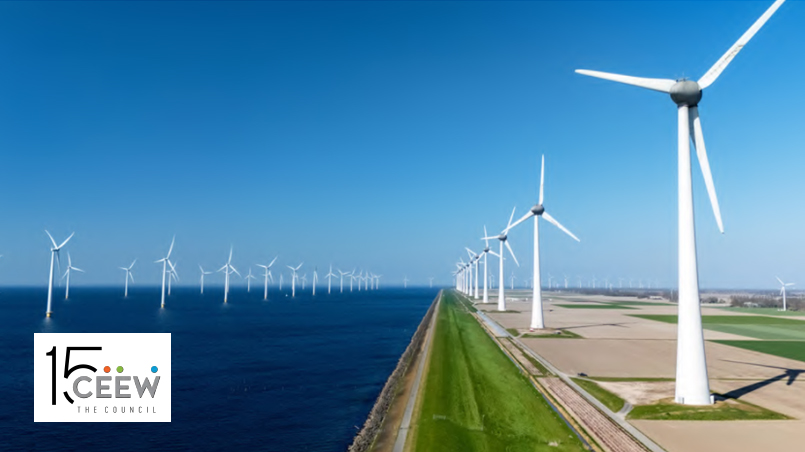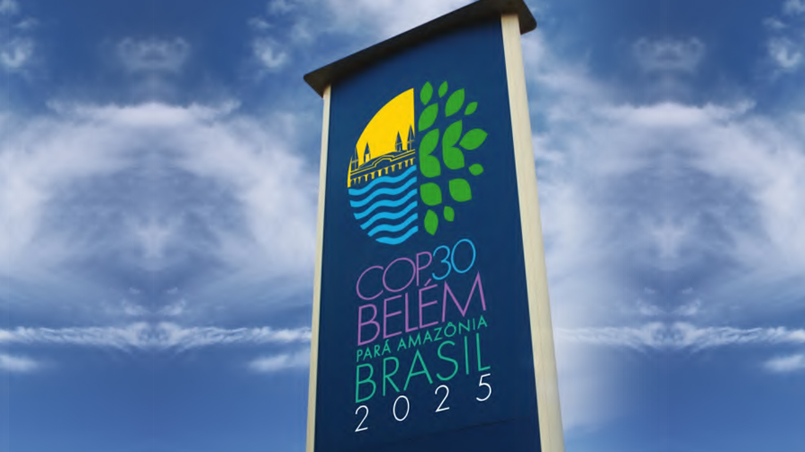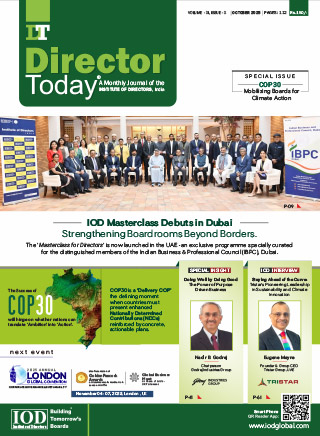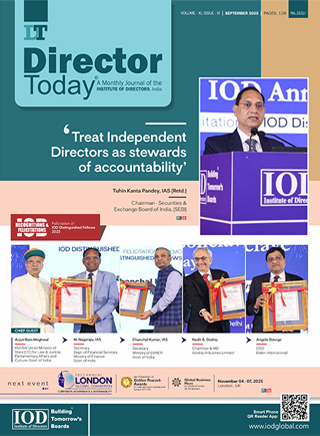A Report on Mumbai Regional Conclave 2025
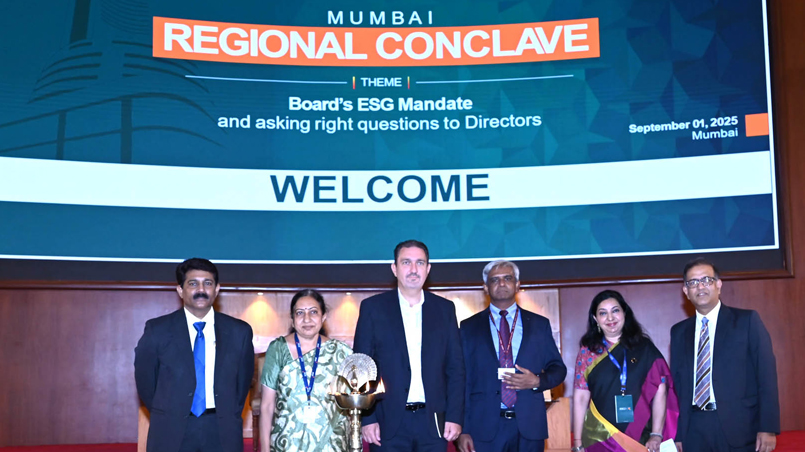
The Institute of Directors (IOD), Western Region, hosted the Mumbai Regional Conclave on September 01, 2025 at the BSE International Convention Hall, Mumbai. This prestigious gathering brought together board members, executives, and thought leaders to discuss the growing importance of Environmental, Social, and Governance (ESG) in shaping corporate strategies.
The theme 'Board's ESG Mandate and Asking the Right Questions to Directors', underscored how ESG is central to long-term value creation, stakeholder trust, and sustainable innovation. The conclave highlighted the evolving role of boards in balancing profitability with responsibility, ensuring that organizations meet both market and societal expectations for responsible growth.
Plenary Session I - Board's ESG Mandate & Asking the Right Questions to Directors
The 'Opening Address' was delivered by:
Ms. Priti Rao Arora
Chief General Manager
Institute of Directors (IOD), Western Region
Ms. Arora set the tone for the event by emphasizing that leadership can no longer be judged by profitability alone but by contributions to sustainable and inclusive growth. She further emphasized that directors must act as custodians of truth, asking relevant questions that probe responsibility, sustainability, and long-term value. On ESG, she highlighted the need for measurable, transparent disclosures while avoiding greenwashing, urging integration of ESG into strategy, not just compliance. Stressing Independent Directors' roles, she stated they should serve as catalysts for embedding sustainability into governance.
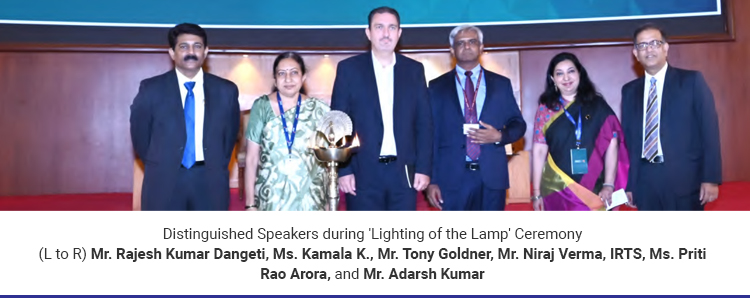
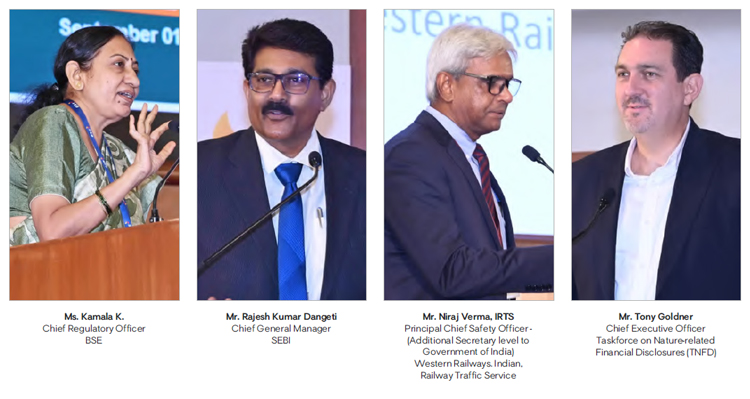
The 'Special Addresses' were delivered by:
1. Ms. Kamala K.
Chief Regulatory Officer
Bombay Stock Exchange (BSE)
2. Mr. Rajesh Kumar Danguti
Chief General Manager
Securities and Exchange Board of India (SEBI)
3. Mr. Neeraj Verma
Principal Chief Safety Officer
Indian Railway Traffic Service (IRTS)
Ms. Kamala, highlighted BSE's 150-year of history, and noted how priorities shifted from pure profit to sustainability post-1980s. She described ESG as the “soul” of governance, stressing that responsibility cannot rest with management alone but must be internalized by every employee. Employing vivid analogies, she compared collective ESG action to the coordinated movements of birds, emphasizing the cumulative impact of small efforts. She urged corporations to respect “Mother Nature” and adapt sustainability across culture, operations, and values. Highlighting rising global conflicts and dissatisfaction, she argued ESG adoption is vital for businesses to remain relevant and responsible. Concluding, she stated companies must align purpose with authentic ESG actions to build trust and ensure longterm stakeholder value.
Mr. Dangeti highlighted ESG's role in protecting shareholder value and building societal trust. He explained SEBI's frameworks from 2012's (BRR) Business Responsibility Report to 2021's (BRSR) Business Responsibility & Sustainability Report, designed to enhance disclosures on climate risk, diversity, and social impact. Stressing on 'ethics over profit', he cautioned that unsustainable practices invite both regulatory action and societal rejection. Independent Directors, he emphasized, cannot remain passive; they must ask probing questions to counter greenwashing and ensure alignment with sustainable goals. Drawing from Indian heritage, he likened ESG principles to ancient respect for nature and community. He concluded that ESG is more than compliance; it drives resilience, competitiveness, and credibility, ensuring sustainable growth in India's global leadership journey.
Mr. Verma outlined ESG's evolution from CSR mandates to integrated frameworks. He emphasized that by 2026–27, India's top 1,000 companies must comply with SEBI's BRSR disclosures, marking a significant governance milestone. Highlighting global investor trends, he noted ESG is now tied to capital access, with 80% of investors factoring sustainability into decisions. For Indian Railways, ESG aligns with Vision 2031, which involves a Rs 16.7 lakh crore investment plan to modernize infrastructure, focusing on station redevelopment, high-speed rail projects like the Mumbai-Ahmedabad bullet train, and expanded freight corridors, and moving towards being a net-zero emitter status by 2030 through green energy solutions and electrification. He stressed on independent directors' crucial oversight in ensuring transparency, fair labour standards, and compliance. Calling ESG a growth driver, not a cost, he underlined its role in unlocking green finance, risk mitigation, and public trust. He concluded by urging organizations to embed ESG into governance DNA.
The 'Keynote Address' was delivered by:
Mr. Tony Goldner
Chief Executive Officer
Taskforce on Nature-related Financial Disclosures (TNFD), UK
Mr. Goldner addressed how business resilience is inseparable from natural ecosystems. He noted that ecosystem services like water, soil, and biodiversity underpin future business continuity. Citing global studies, he highlighted how nature loss disrupts finance, access to capital, and long-term stability. He introduced TNFD's 12 key questions for boards, guiding directors to integrate nature and ESG into strategy beyond compliance. The questions cover five thematic areas: understanding nature's relevance, integrating nature into decisionmaking, external context, organisational competence, and board reflection, guiding boards to ensure effective governance and strategy regarding nature. Addressing ESG criticism, he argued ESG is risk management, not politics, pointing to investor and market pressures, driving adoption. He stressed that the next decade is decisive for ecosystem restoration, biodiversity markets, and sustainable governance. For India, he said public enterprises and regulators can position the country as a global ESG leader by embedding sustainability into policy and practice.
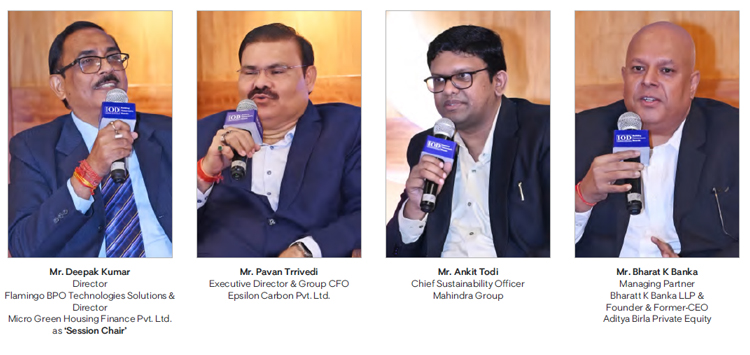
Plenary Session II – Independent Directors at the Forefront of ESG Governance & Stakeholder Trust
The session was moderated by:
Mr. Deepak Kumar
Director - Flamingo BPO Technologies Solutions & Micro Green Housing Finance Pvt. Ltd.
former Executive Director of LIC of India, and LIC Housing Finance Ltd.
The session had the following distinguished speakers:
1. Mr. Ankit Todi
Chief Sustainability Officer
Mahindra Group
2. Mr. Bharat K Banka
Managing Partner
Bharat K Banka LLP & Founder
former CEO - Aditya Birla Private Equity
3. Mr. Pavan Trrivedi
Executive Director & Group CFO
Epsilon Carbon Pvt. Ltd.
Mr. Kumar emphasized on Independent Directors' critical role as custodians of trust and objectivity in ESG governance. It was noted that ESG is no longer voluntary but central to strategy, reputation, and investment, stressing usage of tools like ESG dashboards to enable board-level monitoring and transparency. Independent Directors must ensure transparency, hold boards accountable, and prevent symbolic or “greenwashed” commitments. His address covered the environmental dimension of resource use, social responsibility in labour practices and inclusion, and governance through ethical decision-making. He further
Mr. Todi called for shifting from qualitative claims to measurable, auditable metrics, ensuring credibility and comparability. Differentiating ESG from CSR, he explained CSR is philanthropy-driven, while ESG embeds governance and sustainability into operations. He highlighted SEBI's BRSR as a starting point, noting the need for third-party audits and sector-specific benchmarks aligned with global standards like GRI and SASB. He cautioned against greenwashing, urging genuine emission reductions and lifecycle assessments to avoid misleading claims. Stressing reputational ROI, he explained ESG builds investor trust, employee loyalty, and customer goodwill. He concluded that ESG must be cross-functional, with all departments embedding sustainability into strategy.
Mr. Banka underlined ESG as the “blood in the system,” vital for resilience, trust, and growth. He argued that businesses must expand beyond profit maximization to embrace sustainability, responsibility, and long-term wellbeing. Unlike compliance-driven efforts, he urged companies to move toward meaningful contribution, embedding ESG into decision-making, risk assessment, and culture. This shift, he explained, transforms ESG into a brand advantage, improving trust, employee pride, and global financing opportunities. He stressed that ESG should extend beyond large corporations to mid-sized firms and startups, creating an economy-wide sustainability culture. ESG integration, he said, strengthens governance, innovation, and resilience against risks. Concluding, he stated that leadership is measured by embedding ESG into operations, ensuring businesses deliver profitability alongside societal and environmental benefits.
Mr. Trrivedi, stressed on embedding ESG at the core of operations for long-term growth. He highlighted that growth now depends equally on responsibility, compliance, and societal contribution. He emphasized the importance of audit committees and accurate data, as credible disclosures reduce greenwashing and enhance investor trust. He advocated for converting waste into value, promoting circular economy practices, and adopting renewable energy for sustainability and profitability. He noted ESG adoption varies by capacity, but all companies must aim for global best practices while adapting locally. Concluding, he said ESG is not compliance but discipline, shaping strategy, efficiency, and ethical growth for future readiness.
The 'Vote of Thanks' was proposed by:
Ms. Priti Rao Arora
Chief General Manager
Institute of Directors (IOD)
Closing the conclave, Ms. Arora extended gratitude to the speakers for their valuable perspectives on ESG governance. She emphasized that ESG is not optional but a strategic necessity guiding modern boards. Highlighting Mr. Tony Goldner's keynote address, she praised his insights on nature, governance, and resilience. She recognized Independent Directors as guardians of ethical oversight, ensuring accountability beyond compliance.
Ms. Arora, in conclusion, acknowledged IOD's role in promoting governance and global ESG practices in boardrooms.
This report is compiled by:
Western Region Team
Institute of Directors

Author

Institute of Directors India
Bringing a Silent Revolution through the Boardroom
Institute of Directors (IOD) is an apex national association of Corporate Directors under the India's 'Societies Registration Act XXI of 1860'. Currently it is associated with over 31,000 senior executives from Govt, PSU and Private organizations of India and abroad.
Owned by: Institute of Directors, India
Disclaimer: The opinions expressed in the articles/ stories are the personal opinions of the author. IOD/ Editor is not responsible for the accuracy, completeness, suitability, or validity of any information in those articles. The information, facts or opinions expressed in the articles/ speeches do not reflect the views of IOD/ Editor and IOD/ Editor does not assume any responsibility or liability for the same.

 Quick Links
Quick Links
 Connect us
Connect us




 Back to Home
Back to Home
